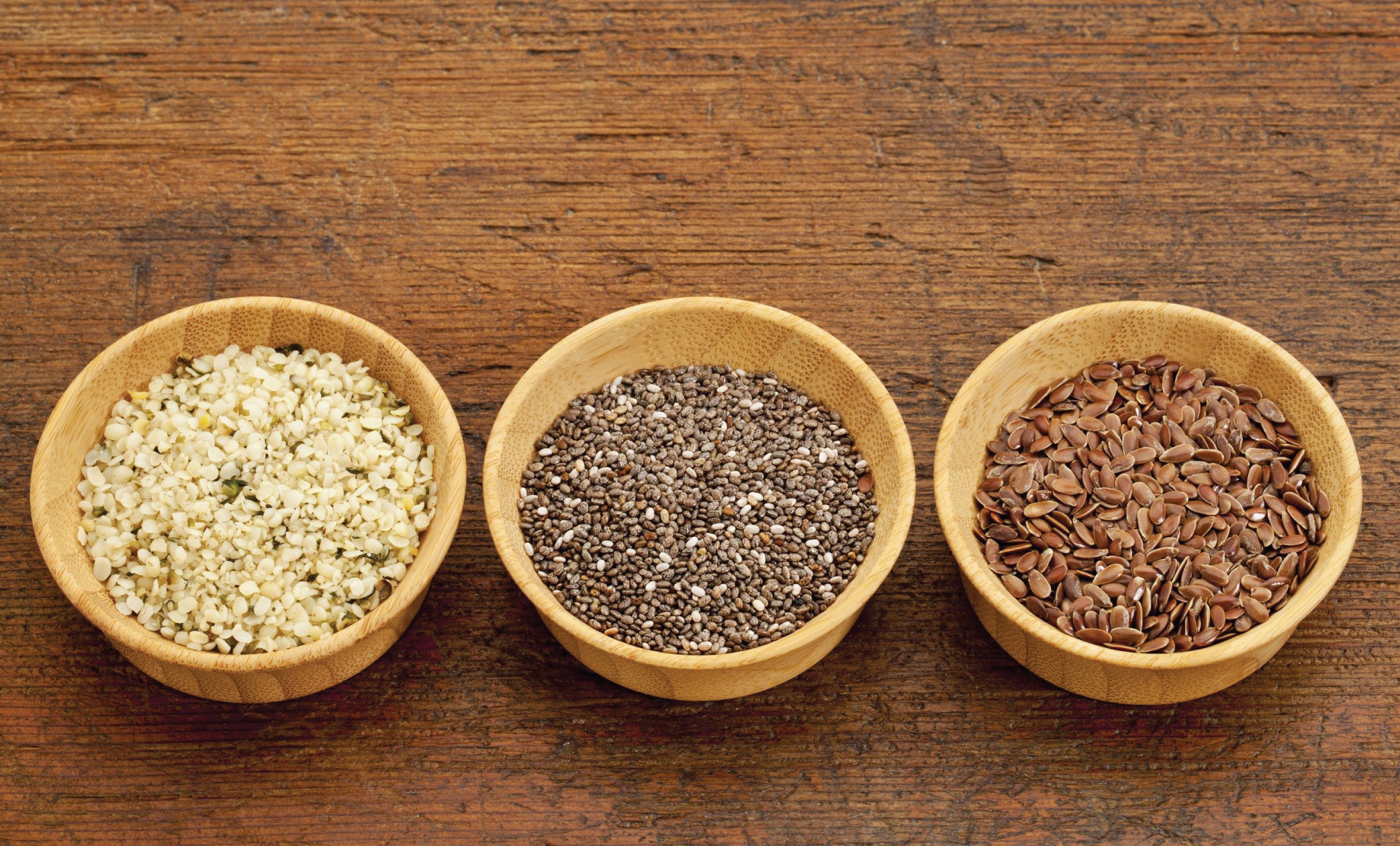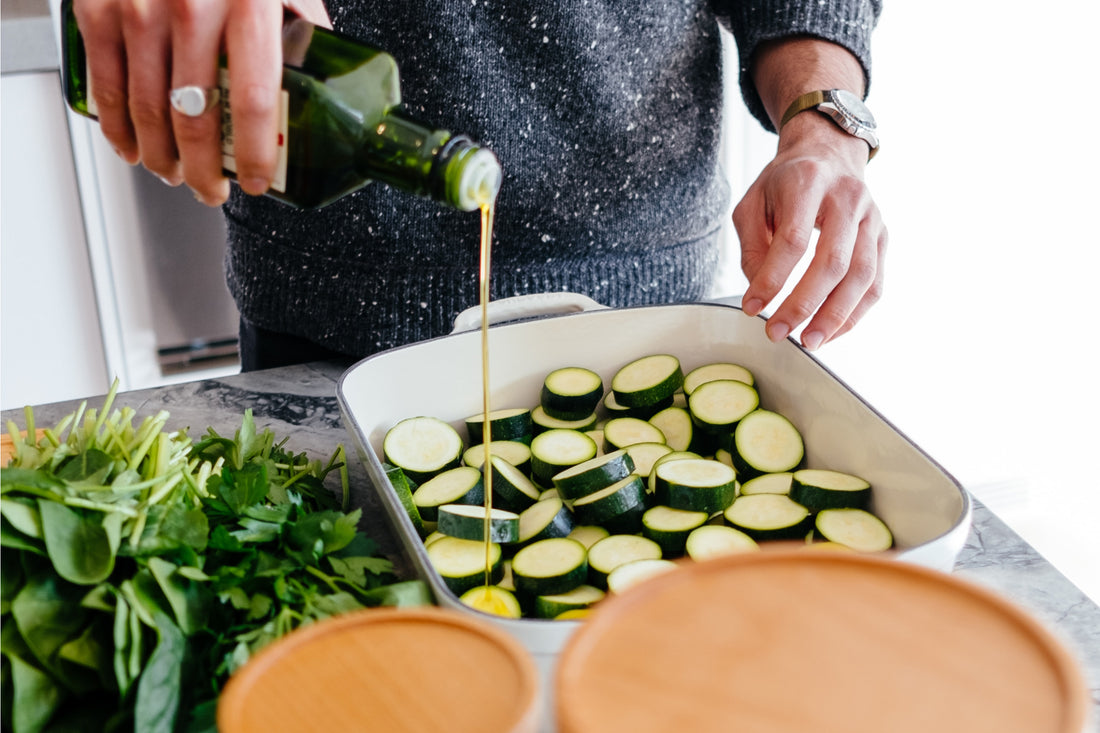Los grandes alimentos pueden venir en envases pequeños. Ya sea que lo supieras o no, las semillas pueden ser tu arma secreta para obtener tu dosis diaria de grasas saludables, proteínas y una variedad de micronutrientes.
Echemos un vistazo a tres súper semillas que son fáciles de incluir en su dieta y que pueden ayudar a mejorar su salud.
Semillas de lino. El superalimento original.

Conocidas como uno de los primeros superalimentos cultivados del mundo, las semillas de lino se consumen desde hace unos 6000 años. Debido a su alto contenido de fibra soluble e insoluble, las semillas de lino tienen la capacidad de mejorar la digestión, reducir el colesterol y promover la pérdida de peso. La fibra puede ayudar a que te sientas satisfecho durante más tiempo después de comer y puede ayudar a atrapar las grasas malas y el colesterol, haciendo que sea más difícil que se absorban en el sistema digestivo.
Tener una piel y unas uñas sanas también depende de las grasas esenciales, así como de las vitaminas B, de las que las semillas de lino son ricas en niveles. Son una de las fuentes más ricas del mundo de ácidos grasos omega-3 de origen vegetal, conocidos como ácido alfa-linolénico (ALA), que es popular para prevenir y tratar enfermedades del corazón y de los vasos sanguíneos. Si eres sensible al gluten o tienes enfermedad celíaca, las semillas de lino son una gran alternativa por sus propiedades antiinflamatorias.
Cómo comer semillas de lino
Como las semillas de lino tienen una cáscara dura, puede resultar complicado comerlas enteras. Es muy recomendable moler las semillas de lino para que el sistema digestivo reciba adecuadamente todos los nutrientes que tienen para ofrecer. En lugar de tener que moler las semillas de lino cada vez que decides añadirlas a una comida, puedes comprar lino molido en la tienda, lo que te hará la vida un poco más fácil.
¡Pruebe agregar algunas semillas de lino molidas a un sabroso lote de waffles integrales!

Receta:
- 2 huevos batidos
- 1 3/4 tazas de leche descremada
- 1/4 taza de aceite de canola
- 1/4 taza de puré de manzana sin azúcar
- 1 cucharadita de extracto de vainilla
- 1 taza de harina integral de repostería
- 1/2 taza de harina de linaza
- 1/4 taza de germen de trigo
- 1/4 taza de harina para todo uso
- 4 cucharaditas de polvo para hornear
- 1 cucharada de azúcar
- 1/4 cucharadita de sal
Semillas de chía. Pequeñas semillas, gran historia.

Las semillas de chía, que originalmente se cultivaban en América del Sur y México, han sido un elemento fundamental en la dieta de los mayas y los aztecas durante siglos. Eran valoradas por su valor nutricional y sus propiedades medicinales e incluso se utilizaban como moneda.
En la lengua maya, chía significa fuerza y era conocida como el alimento de los corredores porque una sola cucharada de chía podía sustentar a una persona durante 24 horas. Hoy en día, las semillas de chía todavía son valoradas por sus beneficios para la salud y su uso en la cocina debido a su rica fuente de nutrientes y antioxidantes. Al igual que las semillas de lino, las semillas de chía tienen un alto contenido de fibra, proteínas y ácidos grasos omega-3. Estas pequeñas semillas se han relacionado con la promoción de una piel sana, el desarrollo de huesos y músculos más fuertes, el apoyo al corazón y al sistema digestivo e incluso la reversión de la diabetes.
Cómo comer semillas de chía
A diferencia de las semillas de lino, las semillas de chía no necesitan molerse para obtener sus beneficios nutricionales. Algunas personas también optan por remojar las semillas de chía antes de comerlas. Remojar las semillas se conoce como "germinar" y libera inhibidores de enzimas, que son moléculas que se unen a una enzima y disminuyen su actividad , matando patógenos y corrigiendo desequilibrios metabólicos . Tampoco está de más comer semillas de chía sin germinarlas primero.
¡Sea creativo y pruebe a hornear estos deliciosos muffins de limón con glaseado de miel y sustituya las semillas de chía por semillas de amapola!

Receta:
- 2 limones grandes (que rinden 1/4 taza de ralladura y 1/3 taza de jugo)
- 1/2 taza de azúcar
- 1 1/2 tazas de harina común
- 1 1/2 cucharadita de bicarbonato de sodio
- 1/2 cucharadita de sal
- 2 cucharaditas de vainilla
- 2 huevos
- 3 cucharadas de aceite
- 1/2 taza de yogur griego natural espeso
- 1/4 taza de leche o crema
- 3 cucharadas de semillas de chía
- 2 cucharadas de semillas de amapola
- 2 cucharadas de miel
Semillas de cáñamo. ¡Cáñamo, cáñamo, hurra!

Las semillas de cáñamo son extremadamente nutritivas y contienen más del 30% de grasas esenciales. Debido a su alto contenido de ácidos grasos, el aceite de semilla de cáñamo tiene la capacidad de aliviar la piel seca, reducir la picazón y mejorar los síntomas del eczema. Las semillas de cáñamo también están llenas de aminoácidos y proteínas que desarrollan los músculos y que se encuentran en otros alimentos como la carne, los huevos y los productos lácteos. El ácido gamma-linolénico que se encuentra en las semillas de cáñamo también se ha relacionado con la reducción de la inflamación, lo que puede disminuir el riesgo de ciertas enfermedades. Curiosamente, las enfermedades cardíacas son conocidas como la principal causa de muerte en todo el mundo. Las semillas de cáñamo o el aceite de semilla de cáñamo pueden ayudar a reducir la presión arterial y disminuir el riesgo de formación de coágulos sanguíneos, ambos factores que pueden ayudar a prevenir ataques cardíacos o ayudar al corazón a recuperarse después de un ataque cardíaco.
Cómo comer semillas de cáñamo
En realidad, no se puede obtener mucho valor nutricional de las semillas sin cáscara, por lo que cuando ves una bolsa en la tienda etiquetada como semillas de cáñamo, en realidad estás comprando los granos internos blandos, también conocidos como corazones de cáñamo. Los corazones de cáñamo se pueden prensar para hacer aceite de semilla de cáñamo, que también deja un subproducto que se puede convertir en proteína de cáñamo en polvo para agregar a batidos o yogur. O simplemente puedes espolvorear corazones de cáñamo sobre la comida que elijas. Puedes esperar que una bolsa de semillas de cáñamo dure aproximadamente un año en el refrigerador o el congelador. Sin embargo, si guardas un paquete en tu despensa, la vida útil será más bien de 3 a 4 meses.
¡Regálese un delicioso batido superalimento de cáñamo!

Receta:
- 1 plátano grande maduro
- Un gran puñado de bayas de jardín o arándanos (congelados)
- 200 ml (3/4 taza) de agua alcalina
- 1 cucharadita colmada de polvo de maca gelatinizado
- 1 cucharada colmada de semillas de cáñamo peladas
- ½ cucharadita de polvo de moringa (u otras superplantas verdes)






